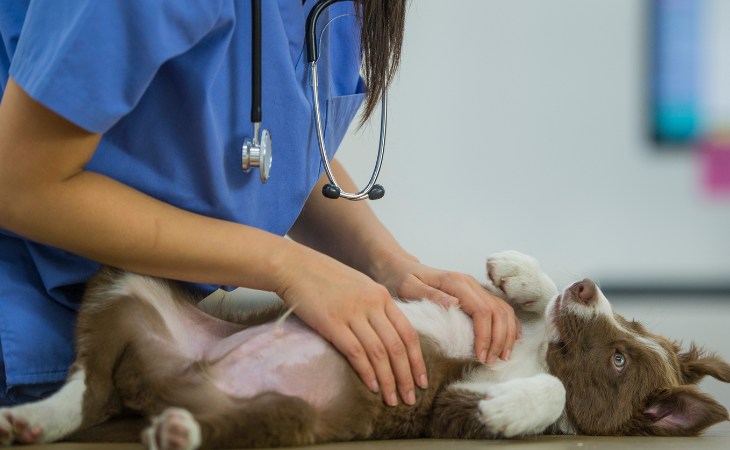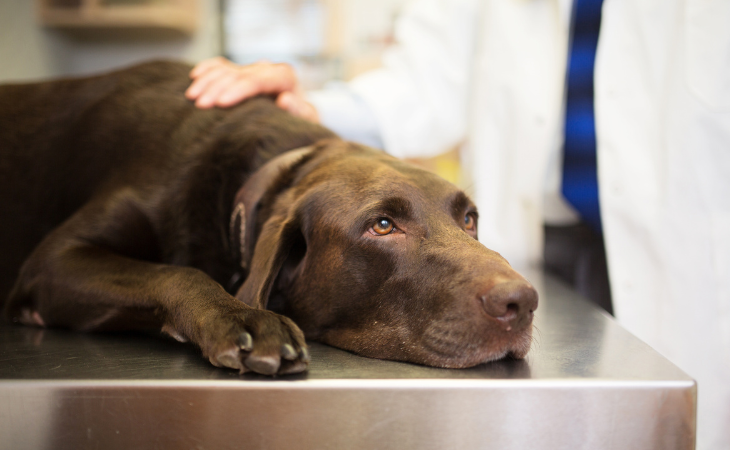Has your dog had diarrhea for several days? Do they have chronic diarrhea? Letsgetpet explains the symptoms, manifestations and possible causes of diarrhea in dogs. By the end of this article, you’ll know how to help your dog recover from their diarrhea.
How do I know if my dog has diarrhea?
Diarrhea is manifested through soft or liquid stools. It can be acute or chronic. When it comes to acute diarrhea, it occurs suddenly and unexpectedly. Chronic diarrhea, on the other hand, occurs when your dog’s diarrhea persists for more than 2 to 3 weeks. Whatever type if diarrhea your dog has, it’s not always easy to tell whether your dog is passing loose or watery stools. However, there are a few common signs that can alert you. These range from mild to severe.
The clinical signs of diarrhea are loose, malformed or watery stools. You may also observe the presence of mucus or blood in your dog’s stools. They may also have more frequent bowel movements than usual. In the case of severe diarrhea, you’ll notice dehydration, especially in puppies and senior dogs.
You may also find notice:
- frequent flatulence,
- pain while defecating,
- bad breath,
- intestinal gurgles.
Sometimes, soft or liquid stool is accompanied by vomiting and a fever. You might also observe that your dog is panting and drinking more water. Your furry friend may seem downcast, lethargic and lose their appetite.
Chronic or acute diarrhea in dogs: what are the possible causes?
Whether it is chronic or acute, diarrhea in dogs can be caused by many different factors.
Your dog’s diet
A dog’s diet is one of the main causes of diarrhea. For example, your dog could have eaten a food that is unsuitable for their nutritional needs. This would be the case if your furry friend ate an expired food, milk, or oxidized kibble. These various poorly digested foods can cause diarrhea. A cereal that is poorly cooked could also cause indigestion and be the cause of your dog’s diarrhea.
A radical change in your dog’s food ration could also cause diarrhea. One of these changes could be changing your dog’s kibble or wet food too suddenly. The quality of your dog’s food is often a factor that could cause this. In an effort to please their pets, some dog parents adopt a diet that is bad quality or unsuitable for their pet.
For example, food that is too high in fatty acids or carbohydrates is not good for dogs. It could easily lead to digestive problems and diarrhea. In other cases, your dog may develop an allergy to a specific food or one of their components. These types of allergies can cause diarrhea, often accompanied by vomiting.
This article might interest you: Can I give my dog my table scraps?
Infections and digestive problems
Infections are also a source of diarrhea in dogs, especially bacterial infections. In fact, just like humans, dogs’ digestive systems contain bacteria, both good and bad. The presence of large quantities of bad bacteria can lead to digestive disorders and diarrhea. The most virulent bacteria are salmonella and Escherichia coli.
Infections at the origin of diarrhea in dogs can also be viral. Particularly dangerous for our furry friends, they are generally parvovirus and canine distemper. If not treated quickly, viral infections can be fatal for your dog.
Outside of infections, digestive tumors, especially lymphomas, lead to repetitive and bloody diarrhea. Intestinal worms are also a source of diarrhea in dogs. These parasites irritate the digestive tubes of your furry friend, which can lead to soft or liquid stool.
The other causes of diarrhea in dogs
Stress can also affect animals. In dogs, stress and anxiety cause intestinal transit problems such as diarrhea. This type of diarrhea is often less violent. However, that does not mean that you should neglect it. Some immune diseases can also lead to diarrhea through cell infiltration, especially the dog’s white blood cells.
Taking certain medication can also lead to diarrhea. Antibiotics often disrupt the normal functioning of the digestive system. Administering them to your dog is one of the causes of diarrhea. Lastly, there are non-digestive causes of diarrhea in dogs. These can include kidney or liver failure.
The different types of diarrhea
Dogs can suffer from different types of diarrhea, each with precise characteristics:
- bloody diarrhea
- yellow diarrhea: very soft or liquid stools,
- glairy diarrhea with dull stools marked by the presence of green streaks and threads of blood.
This type of diarrhea is found in around 13% of dogs. Black diarrhea in dogs, on the other hand, looks like dung. There is no odor, which reveals the presence of digested blood in an animal. There are lastly diarrhea types that accompany vomiting in pets. This type of diarrhea announces gastroenteritis. Your dog would appear more tired than usual and lose their appetite.

What treatments should be put in place if my dog has diarrhea?
Diarrhea, no matter the type, needs to be taken care of quickly and adequately. Here are our tips to help get rid of your dog’s diarrhea.
Natural remedies to to relieve diarrhea
To help your dog feel better, make sure to hydrate them correctly. Make sure that cool water is readily available for them. You can also let their digestive system rest by having them fast for 12 hours. However, we do not recommend doing this for a puppy or senior dog. For puppies and senior dogs, instead of fasting, prioritize a mix of cooked vegetables , turkey, and a broth. You could prepare a dog-friendly soup for your dog’s transition back to their usual diet.
As the diarrhea starts to go away little by little, lessen the amount of soup. When you give the first dose of soup, wait 4 to 6 hours. This will allow you to keep an eye out and check to see if the new stool is soft before giving them more soup.
As a natural solution, we recommend that you give your pet a probiotic treatment. Ask for tips from your vet regarding addition of food supplements to your dog’s diet. These probiotics rebalance the intestinal flora once the diarrhea is treated.
What medications are needed to treat diarrhea in dogs?
Self-medication for dogs is not recommended. During your consult with a vet, they can give certain treatments that can relieve your dog’s diarrhea. Your vet can give a treatment to your pet if they notice:
- frequent liquid stool,
- a risk of dehydration,
- a parasitic infestation or intoxication.
Be attentive to your pet and check the state of their stool. Quick care and support will allow your dog to recover well.

